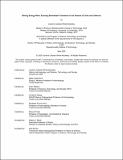Making Energy Work: Enacting Renewable Transitions in the Deserts of Chile and California
Author(s)
White-Nockleby, Caroline Celeste
DownloadThesis PDF (5.041Mb)
Advisor
Helmreich, Stefan
Terms of use
Metadata
Show full item recordAbstract
This dissertation explores how different people enact and engage the “Energy Transition,” a temporal orientation increasingly used to describe a range of activities that operate on and through electricity, renewable energy, and fossil fuels. I ask, given the infrastructural, political, economic, and material-semiotic continuities and imbrications between renewable energies and fossil fuels, how do actors craft, stabilize, and mobilize the [just] renewable energy transition? How, in other words, do people distinguish the activities and projects of the energy transition from continuity and more ordinary change? I also ask, what kind of political work is “transition” – along with its usual modifiers, energy, renewability, and justice – doing in the world? Building on scholarship that explores the history, genealogy, materiality, and political economy of energies and resources, I investigate these questions by analyzing energy transition projects across two region-scale field sites: Antofagasta, Chile and Imperial County, California.
I find that self-consciously small-scale technologies like maps, models, and pilot projects are vital to assembling just, renewable resources – and to demarcating particular places and projects as in transition. Though these technologies often aspire to make and move green energy 24/7 and worldwide, they face substantial obstacles to doing so. Their value is, thus, often drawn more from the future they index than their present functionality. I term these temporal indexical technologies “anticipatory devices,” and show that such devices gain significance in relation to the particular forms of expertise that actors draw on to design them. Each chapter, therefore, analyzes a different disciplinary form of expertise in which the concepts of renewability, justice, transition, and energy, aided by various anticipatory devices, take shape: cartography (Chapters 1 and 2), chemistry (Chapter 3), engineering (Chapter 4), and economics (Chapter 5).
Ultimately, I find that energy transition is often treated as a universalizing, singular narrative, which can shape and limit the scope of climate mitigation projects. Profit motives often incentivize corporate actors to design projects to align with the more temporary kinds of transitions that have long been constitutive of capitalism, even though it is longer-term changes that will most effectively mitigate climate change. The same is true for renewability, which can easily be articulated as an ideal that supports visions for unfettered capitalist growth. Moreover, approaches that treat “transition” as universal can also easily echo and reinvigorate an evolutionist approach to time, in which places and countries compare their relative advancement towards carbon neutrality along a single, teleological temporal axis. Yet I also encountered many actors engaged in more situated projects that attended to local histories of land use, industry, and power. These projects pluralized transition – or did not use the term at all – offering situated and distributive visions of energetic change that might enable more regenerative futures to germinate.
Date issued
2025-05Department
Massachusetts Institute of Technology. Program in Science, Technology and SocietyPublisher
Massachusetts Institute of Technology